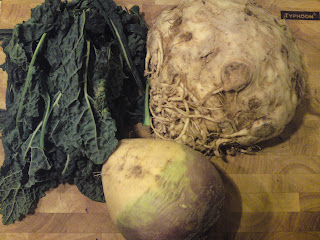roast duck

can't believe i didn't take a picture of the whole duck when it came out of the oven. criminal. and what i did take is blurred - maybe my hands were shaking from hunger.
it's a marvellous thing, a roast duck. all that fat, and fighting over who gets which bit of the skin. it's what home life should be all about.
you'll end up with about a cupful of duck fat from pouring away during roasting - don't throw it away. you can use it to roast lovely things like parsnips or sweet potatoes - or anything else for that matter.
ROAST DUCK
more or less verbatim from the channel 4 hugh fearnley-whittingstall recipe
1 large duck, with neck and giblets
salt and pepper
for the giblet stock/gravy:
The neck and giblets, and wing tips
1 small onion
1 celery stick
1 carrot
a little oil
1 bay leaf
1 small glass of red wine
½ teaspoon redcurrant jelly (optional)
preheat the oven to 220°C/Gas Mark 7. if the duck is tied up, untruss it - i.e. cut the strings and gently pull the legs apart, away from the body. this will help the heat to get at them.
cut off the wing tips (the last bony segment) - there's no meat on them and they will boost the flavour of the giblet stock. make this first: roughly chop up the neck, heart, gizzard and wing tips, plus the onion, carrot and celery. fry these over a fair heat in a little oil until the meat is nicely browned and the vegetables slightly caramelised. transfer to a saucepan with the bay leaf, cover with water (about 600ml) and bring to a simmer. leave at a gentle simmer for about 1¾ hours - i.e. the time it takes to cook the duck.
now tackle the duck. remove any obvious spare fat from inside the cavity. you can, if you like, turn the duck breast-side down on a board and press hard on the middle of the backbone until you hear a crack, it means that when you turn the bird breast-side up again it sits flatter in the pan, which helps it to cook more evenly.4. now, using a needle, prick the skin all over the fatty parts at the breast and where the breast joins the leg. don't prick deeper than is necessary just to pierce the skin. you want the fat to run, but not the juices from the meat. season the skin lightly with salt and pepper.
put the bird in a roasting tin. place into oven for about 20 minutes, so the fat starts to run. then turn the oven down to 180°C/Gas Mark 4, baste the bird and return to the oven.
baste the duck every 20 minutes or so. check the bird for doneness after about 1½ hours' total cooking time. poke a skewer into the thickest part of the leg, close to the breast. when the juices runs clear, the bird is done. tip the bird to pour any fat or juices out of the cavity into the roasting tin and transfer it to a warmed plate or carving tray.
now fix the gravy. carefully pour off the fat from the roasting tin into a heatproof bowl or dish, leaving the brown juices in the tin. deglaze the tin with the red wine, scraping to release any tasty browned morsels. strain the giblet stock and the deglazed pan juices, into a clean pan and boil hard to reduce them to a rich, syrupy gravy. taste for seasoning, and add a little redcurrant jelly for sweetness, if you like.


Comments
Post a Comment